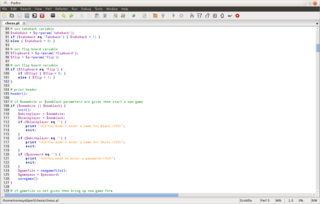
Perl is a high-level, general-purpose, interpreted, dynamic programming language. Though Perl is not officially an acronym, there are various backronyms in use, including "Practical Extraction and Reporting Language".

Ruby is an interpreted, high-level, general-purpose programming language. It was designed with an emphasis on programming productivity and simplicity. In Ruby, everything is an object, including primitive data types. It was developed in the mid-1990s by Yukihiro "Matz" Matsumoto in Japan.

Simple DirectMedia Layer (SDL) is a cross-platform software development library designed to provide a hardware abstraction layer for computer multimedia hardware components. Software developers can use it to write high-performance computer games and other multimedia applications that can run on many operating systems such as Android, iOS, Linux, macOS, and Windows.
Parrot is a discontinued register-based process virtual machine designed to run dynamic languages efficiently. It is possible to compile Parrot assembly language and Parrot intermediate representation to Parrot bytecode and execute it. Parrot is free and open-source software.
Bytecode is a form of instruction set designed for efficient execution by a software interpreter. Unlike human-readable source code, bytecodes are compact numeric codes, constants, and references that encode the result of compiler parsing and performing semantic analysis of things like type, scope, and nesting depths of program objects.

Raku is a member of the Perl family of programming languages. Formerly known as Perl 6, it was renamed in October 2019. Raku introduces elements of many modern and historical languages. Compatibility with Perl was not a goal, though a compatibility mode is part of the specification. The design process for Raku began in 2000.

virt-manager is a desktop virtual machine monitor primarily developed by Red Hat.
Raku rules are the regular expression, string matching and general-purpose parsing facility of the Raku programming language, and are a core part of the language. Since Perl's pattern-matching constructs have exceeded the capabilities of formal regular expressions for some time, Raku documentation refers to them exclusively as regexes, distancing the term from the formal definition.
In computer programming, a green thread is a thread that is scheduled by a runtime library or virtual machine (VM) instead of natively by the underlying operating system (OS). Green threads emulate multithreaded environments without relying on any native OS abilities, and they are managed in user space instead of kernel space, enabling them to work in environments that do not have native thread support.

Clojure is a dynamic and functional dialect of the Lisp programming language on the Java platform.

The TurnKey Linux Virtual Appliance Library is a free open-source software project which develops a range of Debian-based pre-packaged server software appliances. Turnkey appliances can be deployed as a virtual machine, in cloud computing services such as Amazon Web Services or installed in physical computers.

Rakudo is a Raku compiler targeting MoarVM, and the Java Virtual Machine, that implements the Raku specification. It is currently the only major Raku compiler in active development.

Padre is a multi-language software development platform comprising an IDE and a plug-in system to extend it. It is written primarily in Perl and is used to develop applications in this language.
The Maxine virtual machine is an open source virtual machine that is developed at the University of Manchester. It was formerly developed by Sun Microsystems Laboratories, since renamed Oracle Labs. The emphasis in Maxine's software architecture is on modular design and code reuse for flexibility, configurability, and productivity for industrial and academic virtual machine researchers. It is one of a growing number of Java virtual machines written entirely in Java in a meta-circular style. Examples include Squawk and Jikes RVM.
The following outline is provided as an overview of and topical guide to the Perl programming language:
SipHash is an add–rotate–xor (ARX) based family of pseudorandom functions created by Jean-Philippe Aumasson and Daniel J. Bernstein in 2012, in response to a spate of "hash flooding" denial-of-service attacks (HashDoS) in late 2011.

GraalVM is a Java Development Kit (JDK) written in Java. The open-source distribution of GraalVM is based on OpenJDK, and the enterprise distribution is based on Oracle JDK. As well as just-in-time (JIT) compilation, GraalVM can compile a Java application ahead of time. This allows for faster initialization, greater runtime performance, and decreased resource consumption, but the resulting executable can only run on the platform it was compiled for. It provides additional programming languages and execution modes. The first production-ready release, GraalVM 19.0, was distributed in May 2019. The most recent release is GraalVM for JDK 22, made available in March 2024.
ZeroVM is an open source light-weight virtualization and sandboxing technology. It virtualizes a single process using the Google Native Client platform. Since only a single process is virtualized, the startup overhead is in the order of 5 ms.

Windows Subsystem for Linux (WSL) is a feature of Microsoft Windows that allows developers to run a Linux environment without the need for a separate virtual machine or dual booting. There are two versions of WSL: WSL 1 and WSL 2. WSL is not available to all Windows 10 users by default. It can be installed either by joining the Windows Insider program or manually via Microsoft Store or Winget.










